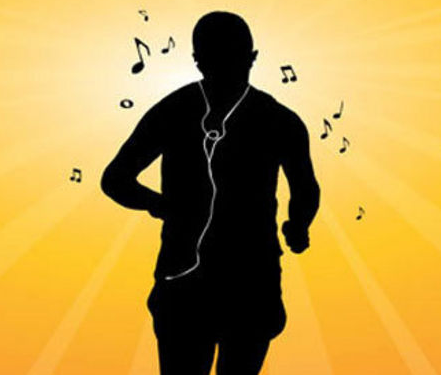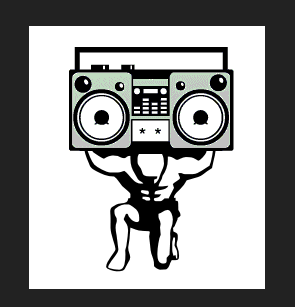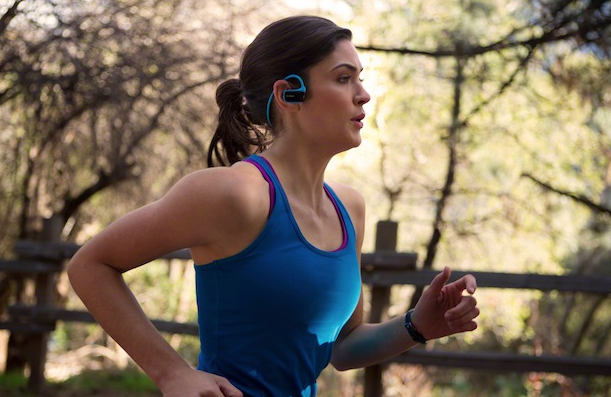 Many runners depend on their tunes to get through their workouts. Other runners never run with music, using the syncopated beats of their breathing or footstriking as their private cadence-like metronome to propel them forward. So, is there a right way or wrong way when it comes to music and running?
Many runners depend on their tunes to get through their workouts. Other runners never run with music, using the syncopated beats of their breathing or footstriking as their private cadence-like metronome to propel them forward. So, is there a right way or wrong way when it comes to music and running? In the following essay by Dr. Phil Maffetone, he explores this aural-performance connection. He asks, “Can music really help you run better?” And then replies, “It can—but not the way you think.”
On the downside, the wrong type of music can even lead to overtraining and possible injury.
Music has been a big part of Phil’s life ever since he retired from coaching world-champion triathletes about a decade ago. In addition to writing two popular books on health and fitness for endurance athletes, Phil taught himself how to play the guitar and became a songwriter with two CDs.
“I woke up one morning in 2002,” says Phil, “and suddenly decided to become a songwriter. I picked up the guitar began to write my own music.” Right around this time, Phil’s holistic methods had come to the attention of influential music producer Rick Rubin. He soon began working with Rubin, Johnny Cash, and The Red Hot Chili Peppers as their personal wellness guru. Interestingly, when Phil was in private practice in New York in the ’80s, one of his patients was singer-songwriter James Taylor.
As for the type of music that Phil writes and plays, it’s a surprisingly original and creative fusion of several forms of popular genres—folk rock, folk with plenty of country, along with jazz and bluesy-like aspects. (Listen here to “Twice in One Lifetime.”)
Last spring, Phil and Dr. Coralee Thompson went on the road for several months as part of their Music & Wellness Tour. They even stopped off in Shepherdstown, West Virginia and with Dr. Mark Cucuzzella’s assistance, they performed at the local opera house– an evening of music and lecture about health and wellness.
Starting in early May 2013, they will be performing throughout the U.S., playing their original music, lecturing on health and fitness. As a bonus, Coralee’s new CD is due out this spring. (For more information on tour dates and cities, go here.)
As with its previous tour, Phil and Coralee’s most popular event will be their “Music and the Brain” presentation. They discuss how to build a better brain—at any age—and prevent the common deterioration seen in aging. They play specific songs throughout their talk to demonstrate how music stimulates many brain regions, and teach participants a unique form of biofeedback that helps control stress and improves physical balance. “Over 5,000 years ago, Chinese medicine included music as a therapy, along with other remedies,” says Phil. “The right kind of music stimulates the brain’s alpha waves, which promotes good, sound health.”
Then, the important concern for all runners is this: how to stimulate those alpha waves for improved performance in training and racing. — Bill Katovsky
***
Can Music Help You Run Faster?
by Dr. Phil Maffetone
Music can do many things for the body. It can improve immunity, digestion, and even hormone balance. That could lead to better running. Music can also help your muscles, and of course that can do wonders for your running. But even more important is that music can improve brain function. And that, more than anything else, can definitely facilitate your ability to become a faster and more efficient runner.These are just a few of the favorite things music can do for the body.
But there are other features of music that could ruin your running.Runners who turn on music for motivation might listen to “Eye of the Tiger” by the rock band Survivor (highlighted in the movie, “Rocky III”. This tune is so stimulating it has no doubt made more than a few couch potatoes take up running. Likewise for “Chariots of Fire,” the musical score for the film of the same name. Get up and go! But these and other physically motivating hits may get many runners going too fast, too far, or too often. They can get your heart pounding. In fact, it’s possible that listening to these stimulating songs while running can raise your heart rate 10 to 15 beats a minute! That, of course, can lead to overtraining, which can trash your running because it wears you out.
 Songs with enthusiastic driving beats are popular in gyms, races, and are often blasted during indoor workouts or through ear buds while putting in miles on the treadmill. But beware. That iPod or smart phone playlist you have depended on for your regular training runs could be setting you back. Beat music—those high intensity songs with strong fast tempos accompanied by loud thumping drums—can whisk us along, sprinting after some elusive pied piper. Power music like this can appear to make a boring workout exciting by passing the time quicker and stimulating our adrenal glands.
Songs with enthusiastic driving beats are popular in gyms, races, and are often blasted during indoor workouts or through ear buds while putting in miles on the treadmill. But beware. That iPod or smart phone playlist you have depended on for your regular training runs could be setting you back. Beat music—those high intensity songs with strong fast tempos accompanied by loud thumping drums—can whisk us along, sprinting after some elusive pied piper. Power music like this can appear to make a boring workout exciting by passing the time quicker and stimulating our adrenal glands. Or give an early morning run an extra dose of energy like a second (or third) shot of caffeine. But this is not why music can help running—this routine can do just the opposite. It can take you to where you don’t want to go—to a world of overexertion that could lead to injuries, fatigue and poor performances.
Just as important, it’s best not to run with an iPod blasting tunes through your ear buds. While commercials have made this image sexy in our fast-paced overactive frantic society, it’s not. If you need this much stimulation to get you going, there’s something wrong. The joy and love of running should be enough incentive, and the desire to get more fit.Don’t get me wrong, I love many of those high-energy songs, and play them often. “Back in the USSR” (Beatles) and “Dani California” (Red Hot Chili Peppers) are two that come to mind. I’ve even written some big-beat songs (listen to “Twice in One Lifetime” on my website). But I’ve never listened to an iPod (and long before that a Walkman) when running.
It’s best to run without your iPod because you don’t want to distract yourself while working out. In short, you want to better experience your body, and be more aware on how it feels. This is what natural running is all about. You want to sense each step, every heart beat, your breathing. And knowing your body well will allow you to understand if something is not just right—much sooner than when your knee starts to hurt or back spasm sideline you.
High-energy music during your run can be a problem. This kind of response to heart-thumping tunes can raise the heart rate, speed you up and run down your nervous system. It can also take you on the path to high anxiety. That’s because it can rev you up so much it increases the production of cortisol, one of our most potent stress hormones, to dangerous levels.High cortisol is no friend of running–and especially not for everyday workouts.
The high cortisol levels can hurt the body and tire out the brain—ruining not just a run or a race, but your life. Even for those who don’t listen to the sounds of frenzied music on the run, cortisol can still be harmful. That’s because any stress increases it—work, commuting, bad diet (especially too much sugar), and personal stress. In addition, running too fast or and too long for your body’s needs can raise cortisol. The result is not just physical injury, but anxiety, depression and reduced health.
Too often, as runners get caught up in the stress of life, they look to a hard workout as a way to relieve the tension. But it doesn’t really work that way. Adding tension to tension is a recipe for disaster. And that includes insisting on getting in that extra workout instead of resting. Along with the wrong kind of running, life’s ongoing merry-go-round can put you in the ground, or at the very least, make you miss life as it passes. John Lennon said it best: “Life is what happens when you’re busy making other plans.
As stress increases, cortisol can elevate to harmful levels producing signs and symptoms that might include fatigue, excess fat storage, poor blood sugar regulation, heart distress, lowered immunity, and reduced brain function. These are just some ways it can ruin running. Instead, you should strive for that natural, athletic high. Running should be fun, peaceful, relaxing, and a time for pondering life or, as most runners know, just not thinking at all. It’s what ‘runner’s high’ is all about. Often associated with natural opiates in the brain, or a cognitive state of dissociation, the runner’s high has been linked with the same brain receptors stimulated by marijuana, which all humans possess.
While running is a common escape from the rigors of a busy daily life, anyone can train their brain to promote this conscious state even when not working out; once you learn it, you can click into it just about any time. This can really help your running. It has to do with brain waves. When you’re mentally and physically relaxed, unstressed, or doing something that takes you to your own private world, such as running, the brain goes into a unique conscious state marked by the production of alpha waves. This state can actually reduce high levels of cortisol. Listening to music does the same thing.
This is how music can help you run better—by listening when you’re not running. By making it part of your life again, like when you were younger. In this case, the brain gets many of the benefits, and since this part of the body regulates everything else, running improves too.
Every breath you take and every step you make is controlled by the brain. And when the brain is adversely affected by too much cortisol, running, like everything else, can become impaired. Too much cortisol can change the brain from goal-oriented learning and planning to habitual stimulus learning—you change from a proactive to a reactive personality. Not something that will help your running, or your life.
Too much cortisol can also contribute to conditions such as Alzheimer’s disease, or in those without the condition, just a bad memory even at an early age. It can both prevent the brain from forming new memories and keep it from accessing an existing one. Memory is something you want to keep on holding onto—how else will you remember moments from that great 10K or your first marathon? As Paul Simon says, “Preserve your memories, they’re all that’s left of you.”
***
***
If you’re interested in hosting a music-and-wellness event by Phil Maffetone and Coralee Thompson at your home, running store or favorite club, please let them know as soon as possible so they can include you on their itinerary. For more information: go here: www.philmaffetone.com or email webmaster@philmaffetone.com.


Wow! Makes so much sense now why I never liked the loud music at the gym. Glad my high school coach agreed we could shut it off while we were in there.
I’m personally always amazed at how much an ipod will mess up a person’s arm swing while running. It’s worst if they hold it in their hand, but even strapped to the upper arm will make a difference. They tend to favor that side and not swing it quite so much, tending to tuck the arm and twist at the shoulder. It is a very obviously unbalanced way to run.
Between that and lack of awareness of traffic, I can’t do headphones while running.
I’ve been a runner for 20 years, and never ran with music. Last Christmas, my kids got me an iPod and I’ve been enjoying listening to music while I run and I wonder how I ever ran so far without it. Now I guess I’ll have to figure it all out again.